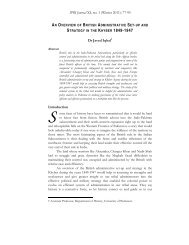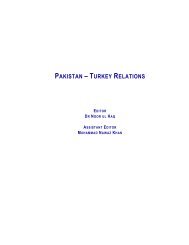120 Whither Kashmir? (Part II) - Islamabad Policy Research Institute
120 Whither Kashmir? (Part II) - Islamabad Policy Research Institute
120 Whither Kashmir? (Part II) - Islamabad Policy Research Institute
Create successful ePaper yourself
Turn your PDF publications into a flip-book with our unique Google optimized e-Paper software.
38 IPRI Factfile<br />
rendered numerous sacrifices. No one should doubt Pakistan’s sincerely<br />
to fight militancy, he said.<br />
The spokesman said that security and development were two<br />
cornerstones of Pakistan’s foreign policy. The spokesman said that<br />
Pakistan did not believe in talks for the sake of talks, rather wanted these<br />
to be result-oriented and meaningful, leading to resolution of all the<br />
outstanding issues including the core issue of <strong>Kashmir</strong>. He said that the<br />
resolution of core disputes would also help tackle other problems faced<br />
by the region, including poverty and disease.<br />
“Pakistan will strive to ensure that talks with India are irreversible<br />
because abrupt severing of negotiations only benefits forces inimical to<br />
both Pakistan and India,” he maintained. To another question, he said<br />
that a major change had been observed in the US policy about Pakistan<br />
and American people also wanted an end to drone strikes inside Pakistan.<br />
Regarding war against terrorism, he said, it could not be won through<br />
force only. Abdul Basit said there were some forces on both sides who<br />
wanted to disrupt the peace process and now it was the responsibility of<br />
the leadership of the two countries to foil their designs.<br />
Nation (<strong>Islamabad</strong>), February 16, 2010.<br />
http://www.nation.com.pk/pakistan-news-newspaper-daily-englishonline//Politics/16-Feb-2010/India-wasted-a-year-by-suspending-talks-FO<br />
LEGALITY OF INDIAN CLAIM ON KASHMIR<br />
Following the World War-<strong>II</strong>, there has been an unremitting resistance by<br />
the people of Subcontinent against the ruling British colonial power.<br />
Under the swelling pressure of the people of subcontinent, the British<br />
Government finally had to announce the partition of the Subcontinent<br />
on June 3, 1947. However, the British Parliament formally passed “The<br />
Indian Independence Act-1947” on July 17, 1947. As per provision of<br />
Article-I of the Independence Act, India was to be partitioned into two<br />
Dominions namely “India” and “Pakistan” from 15th day of August<br />
1947. However, Article 7 of the Indian Independence Act very clearly<br />
states that from 15th August 1947, “the suzerainty of His Majesty over<br />
the Indian states lapse and with it lapses all treaties and agreements in<br />
force at the date of the passing of this Act between His Majesty and the<br />
rulers of Indian states”. Consequent upon this, all powers and functions,<br />
which were exercisable by the British Government in relation to the<br />
Princely States, also ceased.




